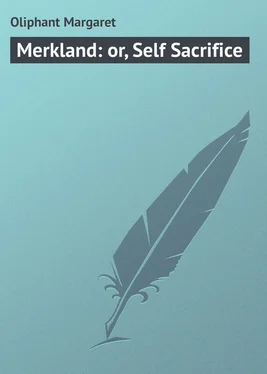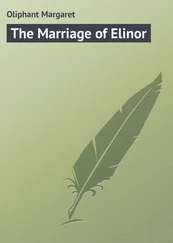Margaret Oliphant - Merkland - or, Self Sacrifice
Здесь есть возможность читать онлайн «Margaret Oliphant - Merkland - or, Self Sacrifice» — ознакомительный отрывок электронной книги совершенно бесплатно, а после прочтения отрывка купить полную версию. В некоторых случаях можно слушать аудио, скачать через торрент в формате fb2 и присутствует краткое содержание. ISBN: , Жанр: foreign_prose, на английском языке. Описание произведения, (предисловие) а так же отзывы посетителей доступны на портале библиотеки ЛибКат.
- Название:Merkland: or, Self Sacrifice
- Автор:
- Жанр:
- Год:неизвестен
- ISBN:http://www.gutenberg.org/ebooks/43811
- Рейтинг книги:4 / 5. Голосов: 1
-
Избранное:Добавить в избранное
- Отзывы:
-
Ваша оценка:
- 80
- 1
- 2
- 3
- 4
- 5
Merkland: or, Self Sacrifice: краткое содержание, описание и аннотация
Предлагаем к чтению аннотацию, описание, краткое содержание или предисловие (зависит от того, что написал сам автор книги «Merkland: or, Self Sacrifice»). Если вы не нашли необходимую информацию о книге — напишите в комментариях, мы постараемся отыскать её.
Merkland: or, Self Sacrifice — читать онлайн ознакомительный отрывок
Ниже представлен текст книги, разбитый по страницам. Система сохранения места последней прочитанной страницы, позволяет с удобством читать онлайн бесплатно книгу «Merkland: or, Self Sacrifice», без необходимости каждый раз заново искать на чём Вы остановились. Поставьте закладку, и сможете в любой момент перейти на страницу, на которой закончили чтение.
Интервал:
Закладка:
“Are the babies to be abolished, then?” said Anne. “For pity’s sake, Marjory, do not sentence the poor little things to masculine nurses. Farewell to all music or harmony, then. If we are to dress babies no more, let it be ordained, I pray you, that there shall be no more babies to dress!”
“Nonsense, Anne!” exclaimed Marjory Falconer, loudly; “you want to ridicule all I say. You are content with the bondage – content to be regarded as a piece of furniture, a household drudge, a pretty doll.”
“Hush!” said Anne; “spare me the abjective. I am in no danger of your last evil. And see how Miss Aytoun looks at you.”
“Never mind,” said Miss Falconer; “Miss Aytoun will sympathise with me, I am sure; every true woman must. See how they smile at our opinions – how they sneer at our judgment – ‘Oh, it’s only a woman.’ I tell you, Anne Ross, all that will be changed by-and-bye. We shall have equal freedom, equal rights – our own proper dignity and standing in the world.”
“And how will it change our position?” said Anne.
“How obtuse you are! Change our position! Why it will make us free – it will emancipate us – it will – ”
“Particulars, particulars, Marjory?”
Miss Falconer paused.
“We shall not be thought unfit any longer to do what men do; our equal mental power and intelligence shall be recognised. We shall have equal rights – we shall be free!”
Anne looked up smiling.
“ ‘And what good came of it at last? said little Wilhelmine.’ ”
Miss Falconer started from her seat in anger, and walked quickly through the room for a moment, Alice looked on in wonder and alarm. At last Marjory approached the table, looked Anne in the face, half smiling, half angry, and replied, in a burst:
“ ‘Nay, that I cannot tell,’ quoth he,
But ’twas a glorious victory?’ ”
Conversation less abstract followed, when Lewis and Ralph joined them; and not long after, Anne and Alice resumed their places in the phaeton, and turned homewards, Lewis riding by their side. Anne’s spirits had wonderfully lightened during their drive, and now she defended Marjory Falconer, almost gaily, against the laughing and half-contemptuous attacks of Lewis.
“Marjory arms all the silly lads in the parish with flippant impertinences about women and their rights, Miss Aytoun,” she said. “I did not mean you, Lewis, so there is no occasion for drowing yourself up. Yet Marjory has some strength, and much kindliness of spirit. And when she has once got rid of those foolish notions, which she will when she has matured a little – ”
Anne stopped abruptly. She had noticed before the tall, stooping figure of a woman advancing towards them, and could recognise now, as the passenger approached, the wan face, and wistful, melancholy eyes, which had made so deep an impression upon her imagination, when she saw them on the previous night, looking so sorrowfully on Merkland. A very remarkable face it was, which the stranger now lifted to them, as she passed slowly on, speaking in its emaciated lines of mental struggle more than bodily sickness; and with its strange habitual look of wistful search, as if its eyes had been exercised by constant watching, and had sought about vainly for some hope or gladness never to be found again. Anne met her steadfast, melancholy look for a moment; in another she had passed on.
“What is the matter, Anne?” said Lewis.
Anne drove on awhile, in silence.
“Did you not observe that face?”
“What face? I saw a woman passing, who stared at you, as you did at her; don’t be sentimental, Anne: some shopkeeper’s wife, from Portoran, who has been at the mill. What were you saying of Marjory Falconer? Go on.”
Anne went on.
“She will mature by-and-by, and come out of these follies a sensible woman. You shake your head, Lewis. She will never be of the gentlest; but sensible, and kindly, and vigorous, I believe she will be, one day. There is often some eccentricity about strength, in its development.”
“Hear, hear,” cried Lewis. “Do you observe how Anne turns her periods, Miss Aytoun? Marjory will keep a chair for you, Anne, in some of her feminine colleges, when she has accomplished the rights of women. Moral philosophy! I hope they will give you an LL.D.”
They reached the mill as Lewis spoke. It stood near the spot Mr. Coulter had spoken of “where three lairds’ lands met;” and the burn was intercepted for the uses of the mill, just before it joined its waters to the Oran.
Anne drew up her ponies at the end of the little bridge, which gave access to the miller’s dwelling. Alice had never seen this picturesque corner of the Oran banks, and Anne proposed giving her a glimpse of the bright interior of Mrs. Melder’s pleasant house: she was anxious herself to ask the miller’s wife if she knew anything of the singular stranger, whose appearance had interested her so much.
So Johnnie Halflin scrambled down from his perch behind, to hold Lewis’s horse, much wondering what motive they could have for calling on Mrs. Melder; and Alice lingered on the grassy bank, that sloped down to the riverside, from Mrs. Melder’s door, to ask questions and to admire. The grey mill buildings, and mighty revolving wheel, and rush of foaming water, as the bairn, like some brown mountain urchin, ran, boisterous, from its labors into the placid Oran, giving life and animation to the stream it increased, were worthy of admiration even more genuine than that of Alice, whose little heart was beating very pleasantly, from various causes, which she had not skill, if she had had inclination, to analyze.
But the cottage door was suddenly flung open, a loud scream startled them, and, turning round alarmed, they saw a child flee out, its little frock blazing, its face distorted with pain and fear. Alice screamed, and clung to the arm of Lewis, Lewis called to the boy, and sprang irresolutely forward himself, not knowing what to do; Johnnie Halflin scampered off in terror, holding firmly the bridle of his charge, and the child, blinded with fear, and scorched with pain, flew forward madly. Anne snatched from the carriage a large, rough plaid, threw herself before the little girl, and wrapped it closer round her. The child struggled – Anne pressed the long, wide folds closer and closer round her, extinguishing the flames with her hands. The terrified miller’s wife ran to her assistance – so did Lewis, and at last, very much frightened, and considerably scorched, but with no serious injury, the child was carried into the house, where Alice followed timidly, pressing the small hand of the sufferer within her own, and murmuring kindly words to still its weeping. It was a little girl of some six years, and moaned out its childish lamentations in broken words of some strange, sweet, foreign tongue. The remnants of its burnt dress, too, were not like the ordinary garments of peasant children, and Mrs. Melder herself had no family.
“God be thankit ye were passing by, Miss Anne!” exclaimed Mrs. Melder. “I am the silliest body mysel that was ever putten in a strait. Eh! do ye no hear my heart beating? – and the stranger bairn!”
“Whose is it, Mrs. Melder?” asked Anne, as they undressed the moaning child, and laid her on the wooden bed which formed part of the furniture of the homely apartment.
“And that is just what I cannot tell ye, Miss Anne,” said the miller’s wife. “It was left wi’ me by ane – ye wad meet her on the road. She wasna put on like a lady, but she wasna a common body either – it was clear to see that. We’ve had a dreary house, Robert and me, since little Bell (ye’ll mind her, Miss Anne?) was ta’en from us, two years syne come Martinmas, and the stranger leddy had heard tell o’t, and thocht, as she said, that I wad be guid to the child – as I will, doubtless, puir, innocent thing! – who could be otherwise?”
Читать дальшеИнтервал:
Закладка:
Похожие книги на «Merkland: or, Self Sacrifice»
Представляем Вашему вниманию похожие книги на «Merkland: or, Self Sacrifice» списком для выбора. Мы отобрали схожую по названию и смыслу литературу в надежде предоставить читателям больше вариантов отыскать новые, интересные, ещё непрочитанные произведения.
Обсуждение, отзывы о книге «Merkland: or, Self Sacrifice» и просто собственные мнения читателей. Оставьте ваши комментарии, напишите, что Вы думаете о произведении, его смысле или главных героях. Укажите что конкретно понравилось, а что нет, и почему Вы так считаете.












